Greetings, once again.
This past Thursday morning, I had a Mass at BC High where we presented the Ignatius Awards to three deserving recipients:
![large_photo37987_537366[1] large_photo37987_537366[1]](https://cardinalseansblog.org/wp-content/uploads/2010/04/large_photo37987_5373661.jpg) John Mahoney
John Mahoney
![large_photo37987_537365[1] large_photo37987_537365[1]](https://cardinalseansblog.org/wp-content/uploads/2010/04/large_photo37987_5373651.jpg) Francis Furey
Francis Furey
![large_photo37987_537367[1] large_photo37987_537367[1]](https://cardinalseansblog.org/wp-content/uploads/2010/04/large_photo37987_5373671.jpg) Norman Swain
Norman Swain
All of them gave very moving witness talks in which they underlined their commitment to the faith and the values that had been nurtured at BC High.
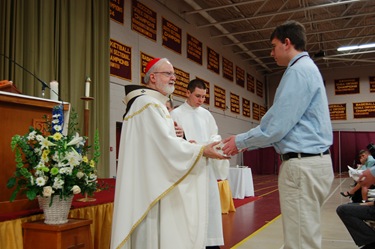
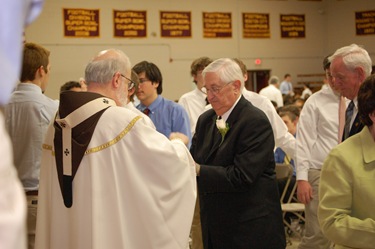
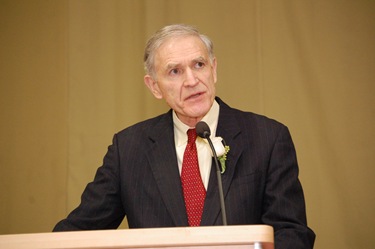
It was a very valuable thing for the young students to hear from these dedicated Catholic laymen who had received such good formation at BC High.
– – –
Later that evening, I attended a dinner for the Jesuits in our area. Each year, they have a banquet to raise funds for the New England Province of Jesuits, particularly to support their retired priests and formation program.
I was happy to be a part of it and to be there with their new provincial, Father Myles Sheehan. I was asked to present him at the banquet. He is a very accomplished physician — a gerontologist. I told him I particularly admired his courage for going on CatholicTV’s “Going MyWay” with Father Chris Hickey, who had him playing the guitar.
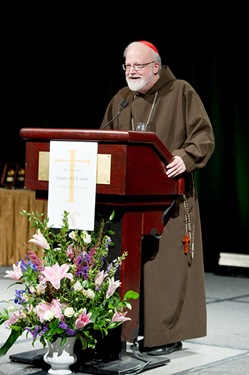
At the dinner, they presented the Ad Majorem Dei Gloriam Award to Dick and Ann Marie Connolly. This award is given annually at this dinner to recognize those who generously help others.
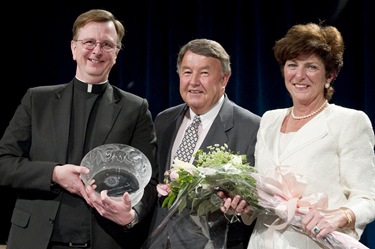
The Connollys with Father Sheehan
You may know that Ad Majorem Dei Gloriam, Latin for “for the greater glory of God”, is the Jesuit motto.
Dick is a very successful financial broker with Morgan Stanley, having been nationally and regionally recognized. He helps organize a golf outing to benefit the Francis Ouimet Caddie Scholarship. Ann Marie enjoyed a marvelous career with an educational consulting firm, serves as a trustee at several non-profit organizations, including Colby College, the Lahey Clinic, and is the incoming chair of Hestia, a women’s group which funds after-school programs. They also support numerous organizations in the region including the Boston Symphony Orchestra, College of the Holy Cross, and WPI. They are parishioners of Holy Family in Concord where Ann Marie serves on the pastoral council.
The evening was a very successful. There were about 1,200 people there — a sign of the great affection people have for the Jesuits who historically have been such an important part of the Archdiocese. In fact, our second bishop, Bishop Fenwick, was a Jesuit.
Still today the order has a very large presence here, numbering about 300.
– – –
On Friday morning, I gave the keynote address at the third annual Co-Workers in the Vineyard Conference at the Campion Renewal Center in Weston.
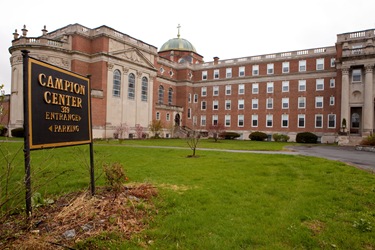
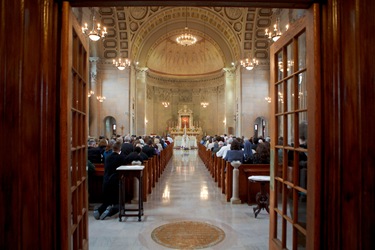
This conference brings together parish staff members — both ordained and lay — from around the archdiocese for a day of reflection about ministry in the Church today.
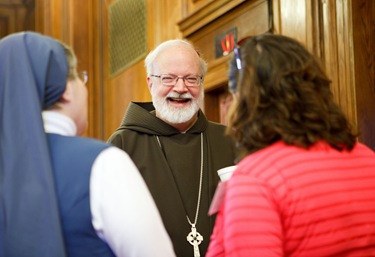
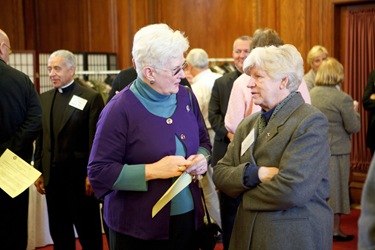
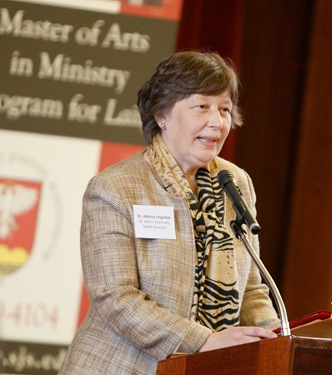
Dr. Aldonna Lingertat, director of the MAM program
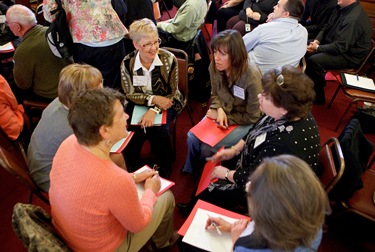
This year there were so many people they had to turn people away from it. It was a very successful conference.
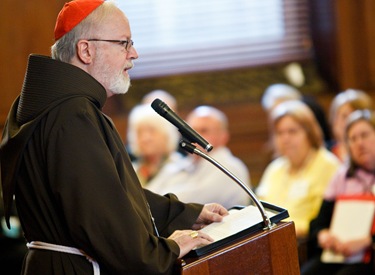
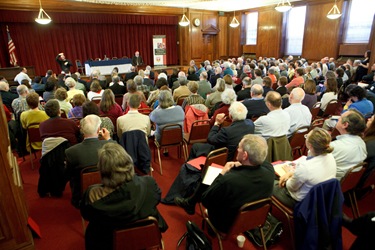
I gave a talk on lay ministry and evangelization. You can listen to my remarks here:
The conference was organized by the Master of Arts in Ministry program at St. John’s Seminary and our Office for Clergy Support and Ongoing Formation, and co-sponsored by other archdiocesan offices. Everybody involved did a wonderful job of running it.
I am also thankful to the support from Our Sunday Visitor, which helped fund the conference.
Following my talk, I recognized Lynn Kenn for all her work witnessing to the pro-life cause. Twenty-five years ago she founded the Parish Baby Shower Program in our Archdiocese to help women in crisis pregnancies.
You can hear my remarks and some comments by Lynn here:
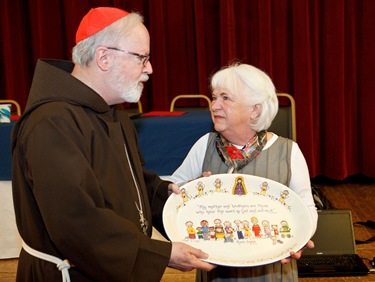
We presented her with a hand-painted plate that showed Lynn with her husband, children and me, all together under Our Lady and angels.
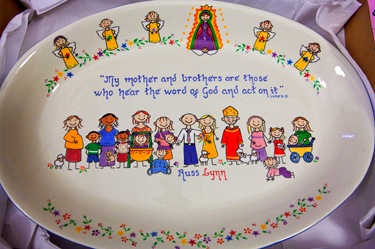

I am so grateful to Lynn and all those who have contributed gifts to this very important effort. It was wonderful that so many of her children and grandchildren could be there for the presentation.
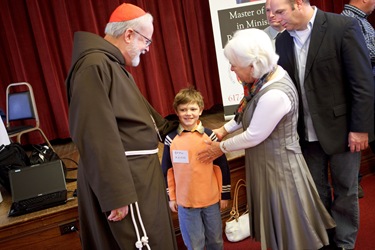
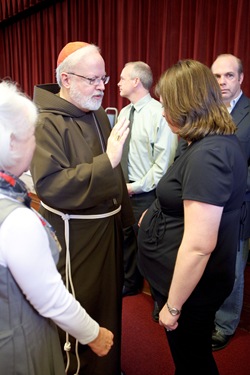
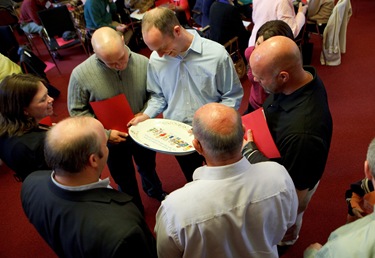
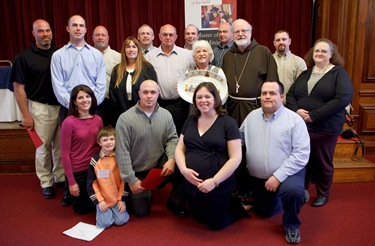
With Lynn, Russ and their family
– – –
On Saturday, we had our annual Boston Catholic Men’s Conference. This year, we were blessed to host it at the Cathedral of the Holy Cross.
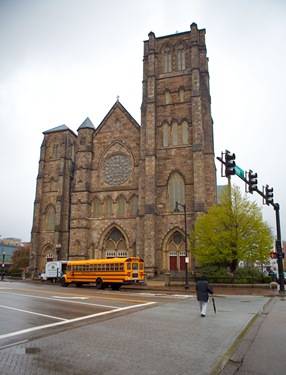
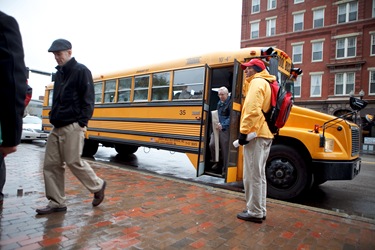
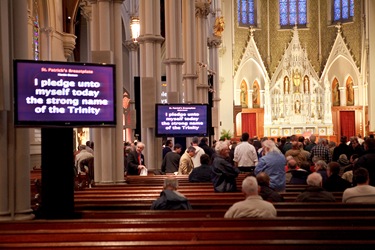
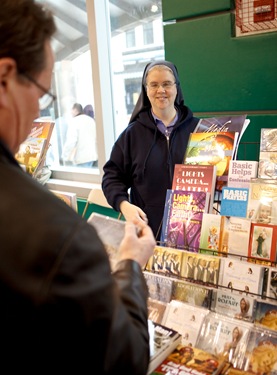
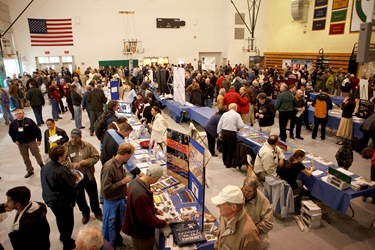
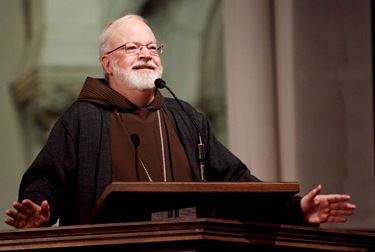
I was the main celebrant and homilist for the Mass that afternoon. You can hear my homily here:
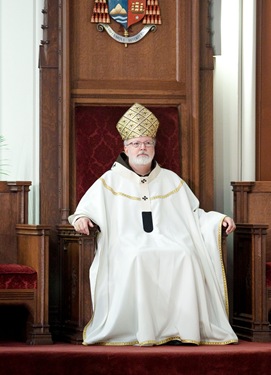
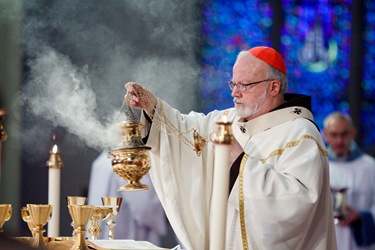
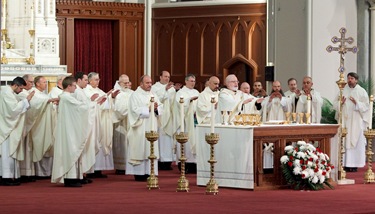
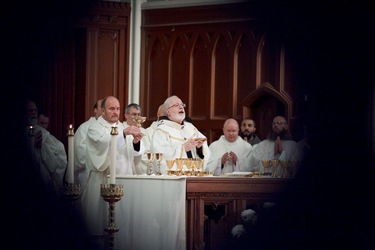
We had over 1,500 men from the Archdiocese of Boston and nearby dioceses who gathered for prayer and reflection. The talks were given by the hosts of EWTN’s “Crossing the Goal.” They were very inspiring.
They talked about the challenges and the importance of being Christian disciples in today’s world.
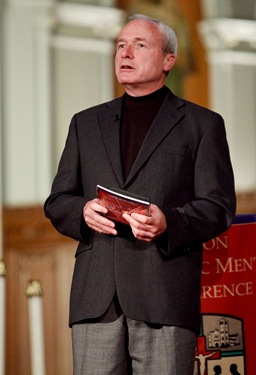 Brian Patrick
Brian Patrick
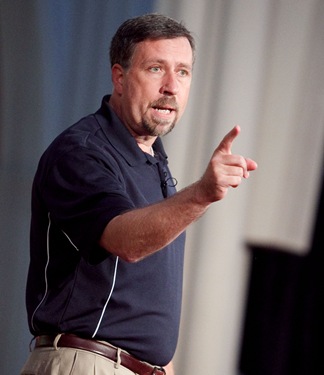 Curtis Martin
Curtis Martin
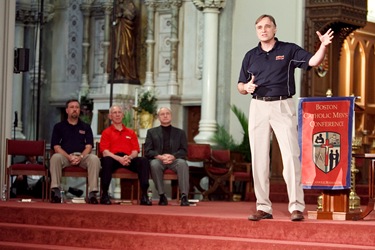 Peter Herbeck
Peter Herbeck
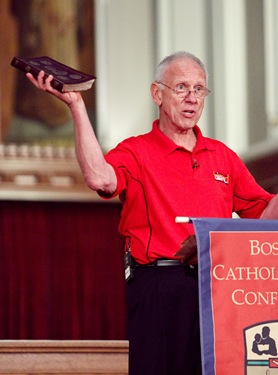 Danny Abramowicz
Danny Abramowicz
In the afternoon, Father Paul O’Brien spoke to the men in the afternoon and shared his story of building the Cor Unum Meal Center at his parish, St. Patrick’s in Lawrence.
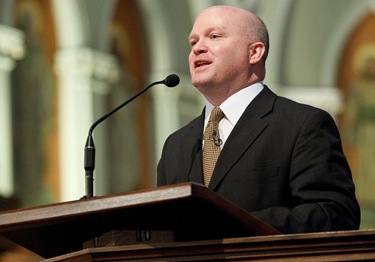 Scot Landry
Scot Landry
We are so grateful to Scot Landry, his team, all the parish captains, the speakers, and the many volunteers that came to facilitate everything.
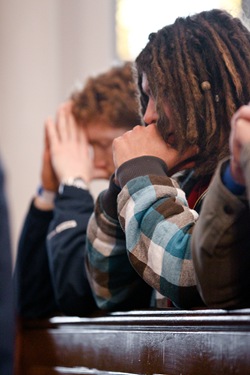
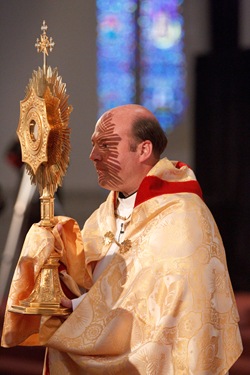
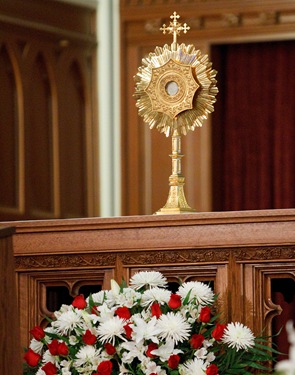
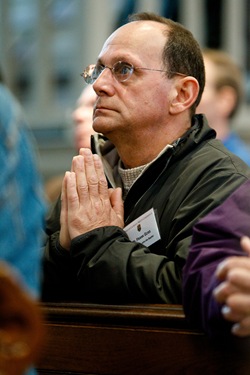
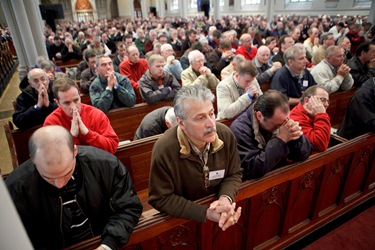
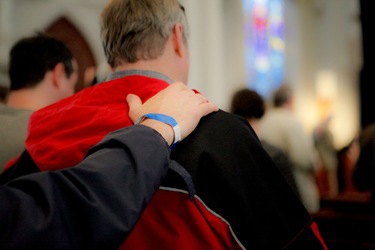
– – –
On Sunday, I returned to Haiti, where I saw the progress of the ongoing earthquake relief efforts.
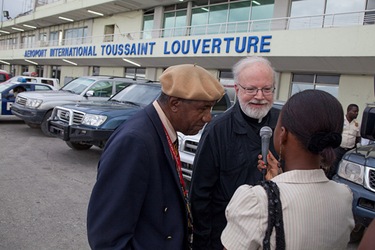
I went back principally to visit the hospital run by the Order of Malta in the town of Milot. During my first trip I did not have time to get to the hospital there, so I promised them that I would return.
The hospital is called Hopital Sacre Coeur, or Sacred Heart Hospital. I would guess that it is currently the best hospital in Haiti. A committee of the Order of Malta runs it, and the hospital is staffed largely with volunteer doctors and nurses from the U.S., though it is administered by resident Haitian doctors. Also, a community of Irish sisters has recently come down to work in the town there.
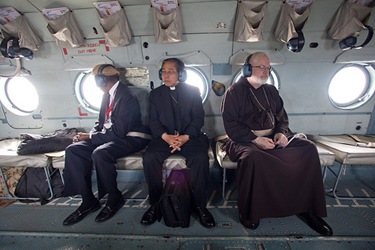
In the helicopter with the Nuncio and his assistant
We flew to Port-au-Prince and then took a helicopter to Milot. When we arrived we were met by schoolchildren, and they sang for us. A little girl in a wheelchair had a bouquet of flowers for me. It was the first time a cardinal had ever visited there so they wanted to make it special.
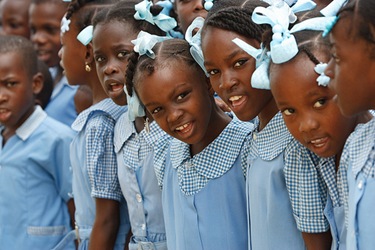
The hospital is an amazing institution by the standards of Haiti. It has all kinds of wonderful equipment, much of it donated through the Ascension Health Care System.
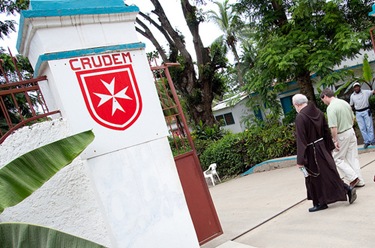
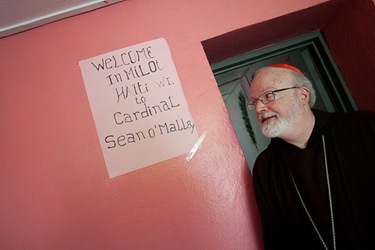
Our Catholic hospitals of Boston — the Caritas Christi system — has been supporting that hospital. They sent down several very special medical tents.
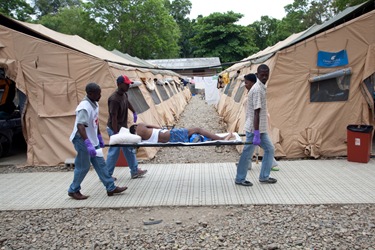
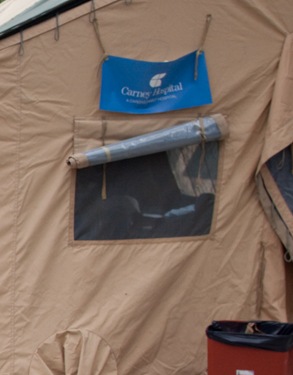
Each of the tents carries the name of one of our hospitals in Boston. This one is the Carney Hospital tent
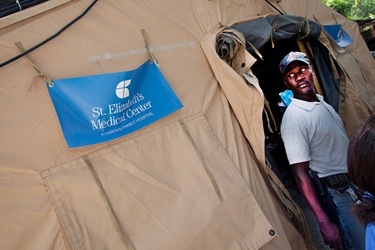
The St. E’s tent
It cost about $250,000 to put them up. The tents have generators, special flooring, electrical systems and lighting. That allowed for an expansion of the hospital from an 80-bed facility to servicing, at one point, up to 500 patients.
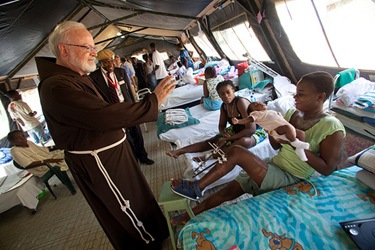
Inside one of the tents
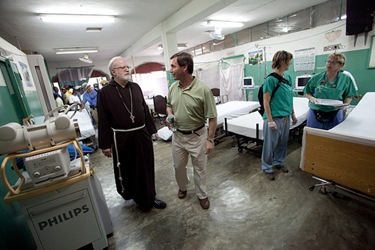
With Peter Kelly – head of the Hospital
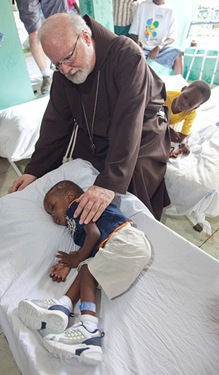
We had 75 doctors and nurses from the Caritas Christi hospitals volunteer to serve in Haiti following the earthquake. We were there with Dr. Mark Pearlmutter, who is head of emergency medicine at Caritas Christi, and Michelle Fey, the head of nursing at Caritas.
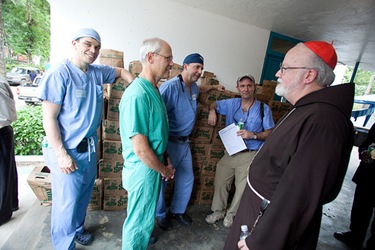
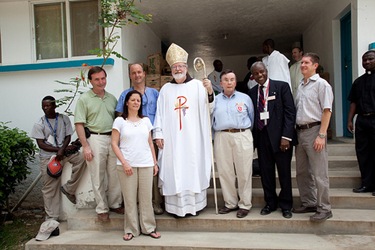
From left, Peter Kelly, Dr. Mark Perlmutter, Michelle Fey – head of nursing services for Caritas , Jim O’Connor from the Order of Malta, Dr. Roger Jean Charles and Scott Campbell from CRS.
It was very encouraging to see how much has been accomplished.
The late Tom Flatley built them a beautiful hospital lab years ago. His sister, who was a chemistry teacher, came and oversaw its set up.
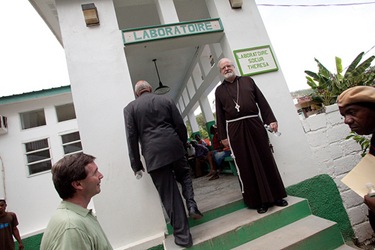
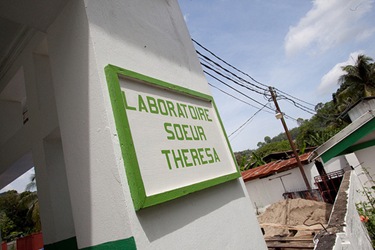
Tom asked that the lab be dedicated to Mother Teresa
The hospital has also installed a water purification plant that runs on solar power. That is so important because potable water is such a luxury in Haiti.
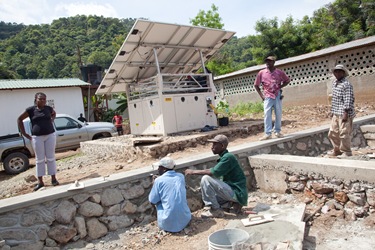
The water purification plant. Right beside it they are building a small factory to make prosthetic limbs for the amputees.
Many children have had limbs amputated. Losing a limb is always a difficult but, for children, it is more complicated because over the period of their growth they will need several new limbs.
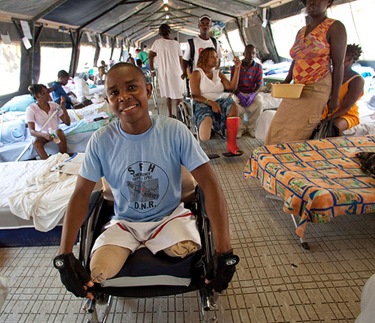
There were some babies with tuberculosis of the spine. One little baby was found in the rubble four or five days after the earthquake buried under dead bodies, including those of her parents.
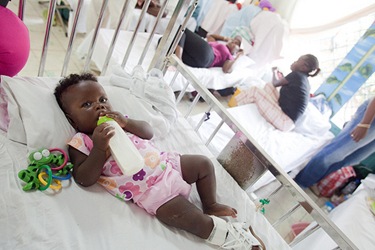
As you can see, she’s doing fine
This hospital, because it is out in the countryside, was not at all affected by the earthquake, so it became the major trauma center after the earthquake. The U.S. military and the U.N. would bring several patients a day by helicopter for surgery and medical care at this wonderful hospital.
In the following video, published back in February, Dr. Perlmutter described in a very moving way the efforts our physicians performed in the aftermath of the earthquake.
The area we were visiting is part of the Archdiocese of Cap-Haïtien. After we visited the patients, we had an outdoor Mass for the patients and the staff. Archbishop Louis Kébreau, who is a salesian, concelebrated.
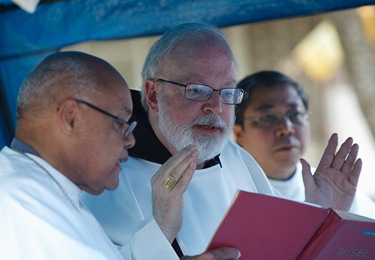
From the left, Archbishop Louis Kébreau and the Nuncio, Archbishop Bernardito Cleopas Auza
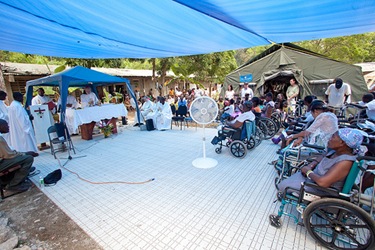
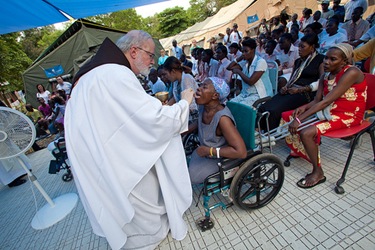
Some of the town’s people also came to the Mass. I celebrated the Mass in Creole. The youngsters were all fascinated that this old white man spoke Creole!
It was a beautiful celebration. There was lovely singing. Haitians, of course, have such a beautiful sense of celebration.
After visiting the hospital, the archbishop invited us to visit the ruins of the Sans-Souci Palace, which is the palace of King Henri Christophe, who, after the Haitian revolution 200 years ago ruled the Northern Kingdom. The southern part of the country became a republic. He built this beautiful Versailles-like palace there in the town of Milot, which was the capital of the Northern Kingdom.
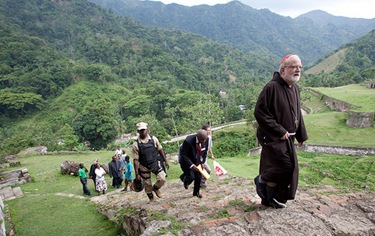
Walking up the hill towards the palace
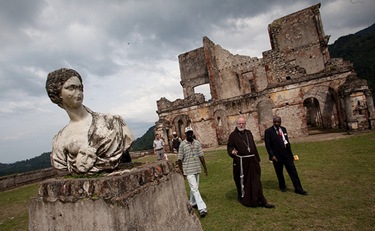
The ruins of the King Henri Christophe Sans-Souci Palace.
This is a statue of his wife
The palace was destroyed in 1842, during another earthquake that devastated the region and was never rebuilt.
The only part of the palace that is still intact from that time is the chapel, which is used as the parish church. It has an extraordinary dome.
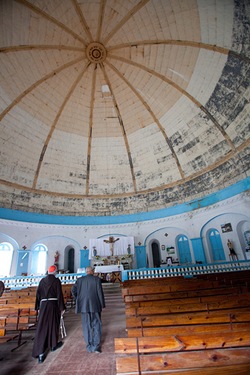
When we came down the mountain we were greeted by a band. The children had very spiffy uniforms, but very old instruments. They played the national anthem and then another song, which was a greeting song.
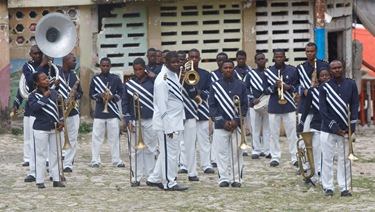
The children of the parish gave us a presentation on their pro-life and chastity courses they have at the parish. I was impressed by it.
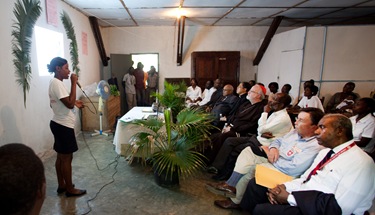
They also gave me a beautiful painting showing the parish and what the palace looked like originally. It was done in the typical Haitian “primitivisme” style.
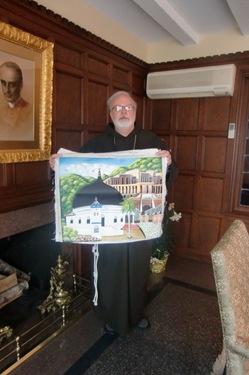
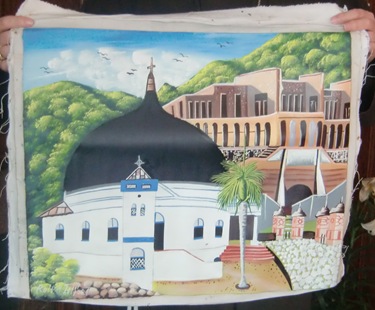
It was a very interesting visit and I was impressed by the works that our people are doing. You can look at more photos here and watch a video that summarizes the day:
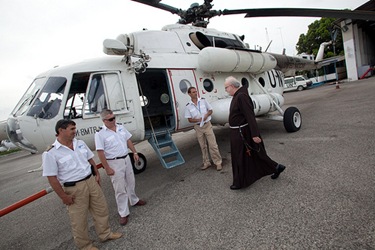
We returned to Port-au-Prince in the evening and we had dinner at the Nunciature with a number of the officials from the UN, the Banco Interamericano de Desarrollo and other NGOs. The nuncio was good enough to bring these people together so we could hear from them their hopes, objectives and concerns. What an excellent job the nuncio is doing!
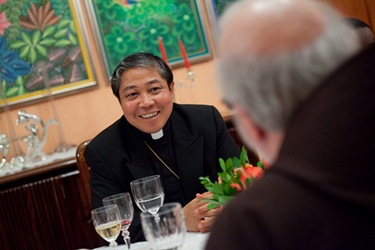
Also, we had time to spend with the administrator of Port-au-Prince, Monsignor Joseph Lafontant.
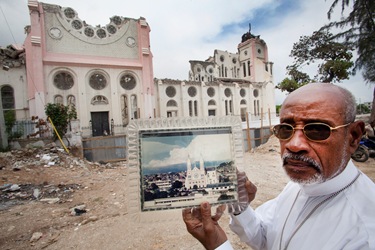
Msgr. Lafontant showing us a photo of the Cathedral before the earthquake
In Port-au-Prince the next day, we visited the Catholic hospital that is being administered by Catholic Relief Services. It’s basically in tents, but it’s on the site of the oldest hospital in Port-au-Prince, Hospital St. Francois de Sales.
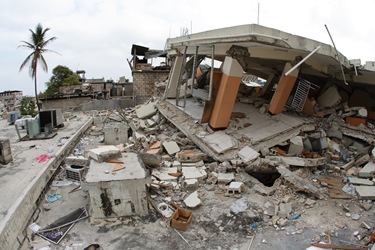
This is what is left of the St. Francois de Sales Hospital
The group of surgeons we met there are from Bon Secours Hospital in Baltimore. When we met the doctors, some were wearing lamps on their foreheads, like miners, because they kept losing electricity and would have to do operations by flashlight.
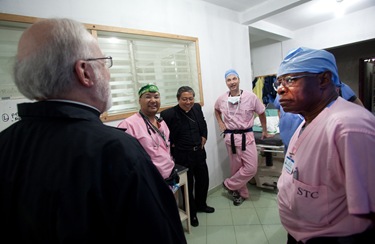
Talking with the doctors
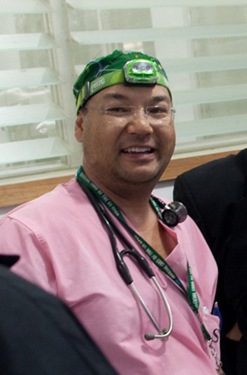 A closer look at a doctor with a flashlight they use to perform surgery
A closer look at a doctor with a flashlight they use to perform surgery
by flashlight
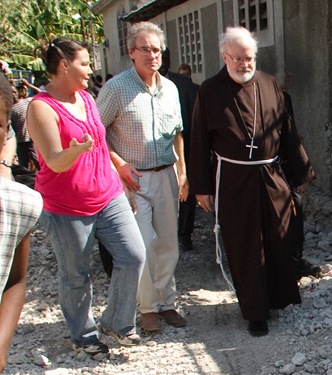
On that visit we were accompanied by Deacon Patrick Moynihan and his wife. As you may remember from my post on my first visit they are running a very successful school for poor children there
The recovery after the earthquake is very, very slow. About 1.5 million people are still in tent cities. You don’t see heavy equipment moving the rubble. There has been a lot of planning going on up until now but you don’t see dramatic improvements.
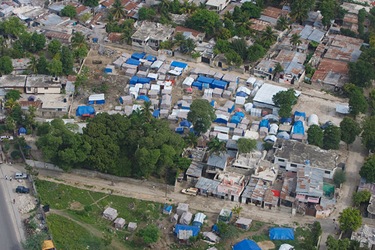
An aerial view of Port-au-Prince from our helicopter. You can see a tent-city and collapsed houses
Right now, the priority is to get permanent housing for the people. That has its challenges, but they’re beginning to initiate projects of bringing in prefabricated housing.
After that, they’ll try to deal with the situation of the schools. Presently, very few children are able to attend school.
Also, the nuncio is anxious to begin to rebuild some of the churches, if nothing else, to be a sign of hope to the people and that things will return to some normalcy. Our bishops’ conference has had conversations with Catholic relief organizations in Europe to try and coordinate what specific projects each will be responsible for. Of course, Catholic relief organizations are still the lead organizations as far as relief efforts. They have done an extraordinary job there.
Please continue to pray for the people of Haiti, and for all who are administering relief efforts.
– – –
Yesterday, I was very happy to be visited by Pablo Eduardo, a local sculptor who has produced some very significant art for the Boston area.
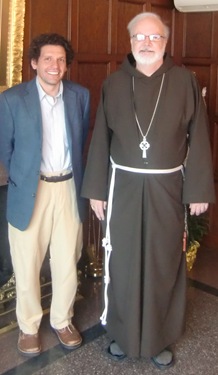
I have known him since he was a child because his father worked for me in Washington as editor of the Spanish-language archdiocesan newspaper, El Pregonero.
I was pleasantly surprised when I came to Boston to discover that Pablo was here with his family and has a studio in Gloucester. He has done beautiful works including a statue of Boston Mayor Kevin White commissioned by the city.
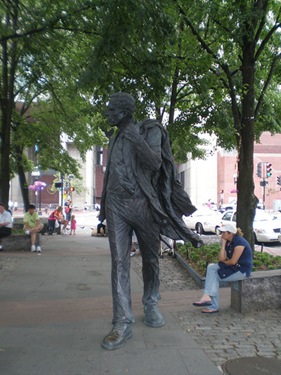
He also has created a statue of St. Ignatius of Loyola at Boston College.
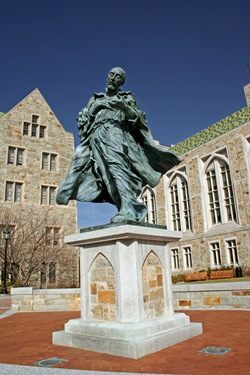
Pablo is now finishing his work on a statue of St. Thomas More for the BC Law School.
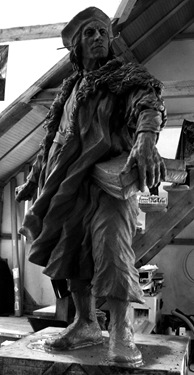
Until next week,
Cardinal Seán
